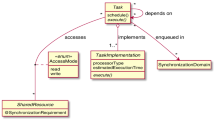Abstract
This paper describes the scheduling issues specific to the Tera MTA (Multi Threaded Architecture) and presents solutions to classic scheduling problems. The Tera MTA exploits parallelism at all levels, from fine-grained instruction-level parallelism within a single processor to parallel programming across processors, to multiprogramming among several applications simultaneously. Consequently, scheduling of resources occurs at many levels, and managing these resources poses unique and challenging scheduling concerns. This paper outlines the scheduling algorithms of the user level runtime and operating system and describes the issues relevant to each. Many of the issues encountered and solutions proposed are novel, given the multithreaded, multiprogrammed nature of our architecture. In particular, we present an algorithm for swapping a set of tasks to and from memory that achieves minimal overhead, largely independent of the order in which tasks are swapped.
This research was supported by the United States Advanced Research Projects Agency Information Science and Technology Office ARPA Order No. 6512/2-4; Program Code No. OT10 issued by ARPA/CMO under Contract MDA972-90-C-0075. The views and conclusions contained in this document are those of Tera Computer Company and should not be interpreted as representing the official policies, either expressed or implied, of ARPA or the U. S. Government.
Preview
Unable to display preview. Download preview PDF.
Similar content being viewed by others
References
R. Alverson, D. Callahan, D. Cummings, B. Koblenz, A. Porterfield, and B. Smith. The Tera computer system. In 1990 International Conference on Supercomputing, June 1990.
I. Ashok and J. Zahorjan. Scheduling a mixed interactive and batch workload on a parallel, shared memory supercomputer. In Supercomputing 1992, Nov 1992.
M. J. Bach. The Design of the Unix Operating Systems. Prentice-Hall, Inc., 1986.
D. Burger, R. Hyder, B. Miller, and D. Wood. Paging tradeoffs in distributedshared-memory multiprocessors. In Supercomputing '94, November 1994.
D.L. Eager, E.D. Lazowska, and J. Zahorjan. Adaptive load sharing in homogeneous distributed systems. IEEE Transactions on Software Engineering, May 1986.
D.L. Eager, E.D. Lazowska, and J. Zahorjan. A comparison of receiver-initiated and sender-initiated adaptive load sharing. Performance Evaluation, March 1986.
R. Essick. An event-based fair share scheduler. In Winter 90 USENIX Conference, January 1990.
D. G. Feitelson and L. Rudolph. Distributed hierarchical control for parallel processing. Computer, 23(5), May 1990.
D. G. Feitelson and L. Rudolph. Gang scheduling performance benefits for finegrain synchronization. Journal of Parallel and Distributed Computing, 16(4), May 1992.
Raphael Finkel. An Operating Systems Vade Mecum. Prentice-Hall, Inc., 1986.
A. Gottleib, B. Lubachevsky, and L. Rudolph. Basic techniques for the efficient coordination of very large numbers of cooperating sequential processors. ACM Transactions on Programming Languages and Systems, 5(2), April 1983.
A. Gupta, A. Tucker, and S. Urushibara. The impact of operating system scheduling policies and synchronization methods on the performance of parallel applications. In ACM SIGMETRICS Conference, May 1991.
G. J. Henry. The fair share scheduler. Bell Laboratories Technical Journal, 63(8), October 1984.
S. Leutenegger and M. Vernon. The performance of multiprogrammed multiprocessor scheduling policies. In ACM SIGMETRICS Conference, May 1990.
C. McCann, R. Vaswani, and J. Zahorjan. A dynamic processor allocation policy for multiprogrammed, shared memory multiprocessors. ACM Transactions on Computer Systems, May 1993.
C. McCann and J. Zahorjan. Processor allocation policies for message-passing parallel computers. In ACM SIGMETRICS Conference, May 1994.
V. Naik, S. Setia, and M. Squillante. Performance analysis of job scheduling policies in parallel supercomputing environments. In Supercomputing 1993, November 1993.
V. Naik, S. Setia, and M. Squillante. Scheduling of large scientific applications on distributed memory multiprocessor systems. In 6th SIAM Conference on Parallel Processing for Scientific Computation, March 1993.
J. Ousterhout. Scheduling techniques for concurrent systems. In 3rd International Conference on Distributed Computing, Oct 1982.
S. Setia, M. Squillante, and S. Tripathi. Processor scheduling on multiprogrammed, distributed memory parallel systems. In ACM SIGMETRICS Conference, May 1993.
K. Sevcik. Characterization of parallelism in applications and their use in scheduling. In ACM SIGMETRICS Conference, May 1989.
J. H. Straathof, A. A. Thareja, and A. K. Agrawala. Unix scheduling for large systems. In Denver USENIX Conference, January 1986.
J. H. Straathof, A. A. Thareja, and A. K. Agrawala. Methodology and results of performance measurements for a new unix scheduler. In Washington USENIX Conference, January 1987.
A. Tucker and A. Gupta. Process control and scheduling issues for multiprogrammed shared-memory multiprocessors. In 12th ACM Symposium on Operating System Principles, December 1989.
D. Wagner and B. Calder. Leapfrogging: A portable technique for implementing efficient futures. In Fourth ACM SIGPLAN Symposium on Principles and Practice of Parallel Programming, May 1993.
J. Zahorjan, E. Lazowska, and D. Eager. Spinning versus blocking in parallel systems with uncertainty. In International Sympossium on Performance of Distributed and Parallel Systems, December 1988.
J. Zahorjan, E. Lazowska, and D. Eager. The effects of scheduling discipline on spin overhead in shared memory parallel systems. IEEE Transactions on Parallel and Distributed Systems, April 1991.
J. Zahorjan and C. McCann. Processor scheduling in shared memory multiprocessors. In ACM SIGMETRICS Conference, May 1990.
Author information
Authors and Affiliations
Editor information
Rights and permissions
Copyright information
© 1995 Springer-Verlag Berlin Heidelberg
About this paper
Cite this paper
Alverson, G., Kahan, S., Korry, R., McCann, C., Smith, B. (1995). Scheduling on the Tera MTA. In: Feitelson, D.G., Rudolph, L. (eds) Job Scheduling Strategies for Parallel Processing. JSSPP 1995. Lecture Notes in Computer Science, vol 949. Springer, Berlin, Heidelberg. https://doi.org/10.1007/3-540-60153-8_21
Download citation
DOI: https://doi.org/10.1007/3-540-60153-8_21
Published:
Publisher Name: Springer, Berlin, Heidelberg
Print ISBN: 978-3-540-60153-1
Online ISBN: 978-3-540-49459-1
eBook Packages: Springer Book Archive




